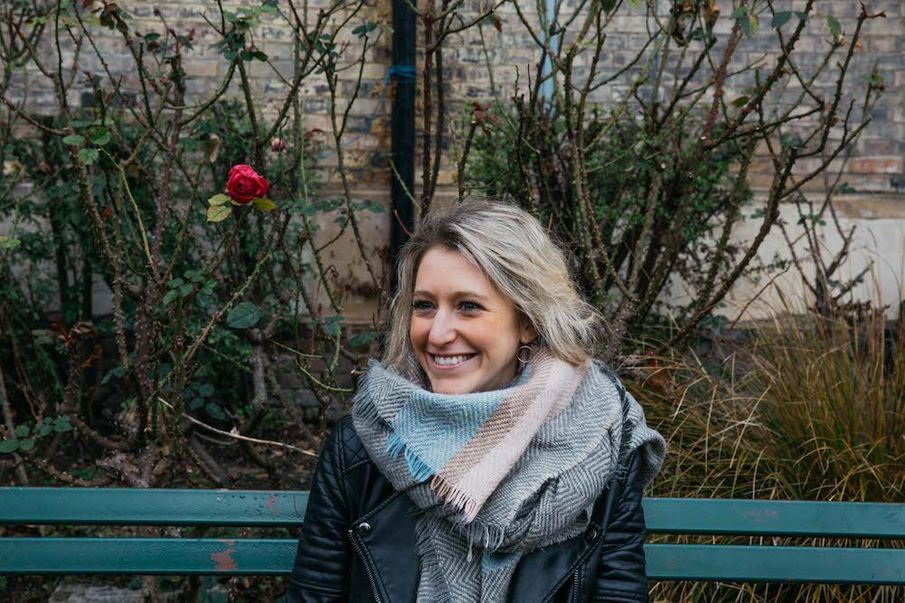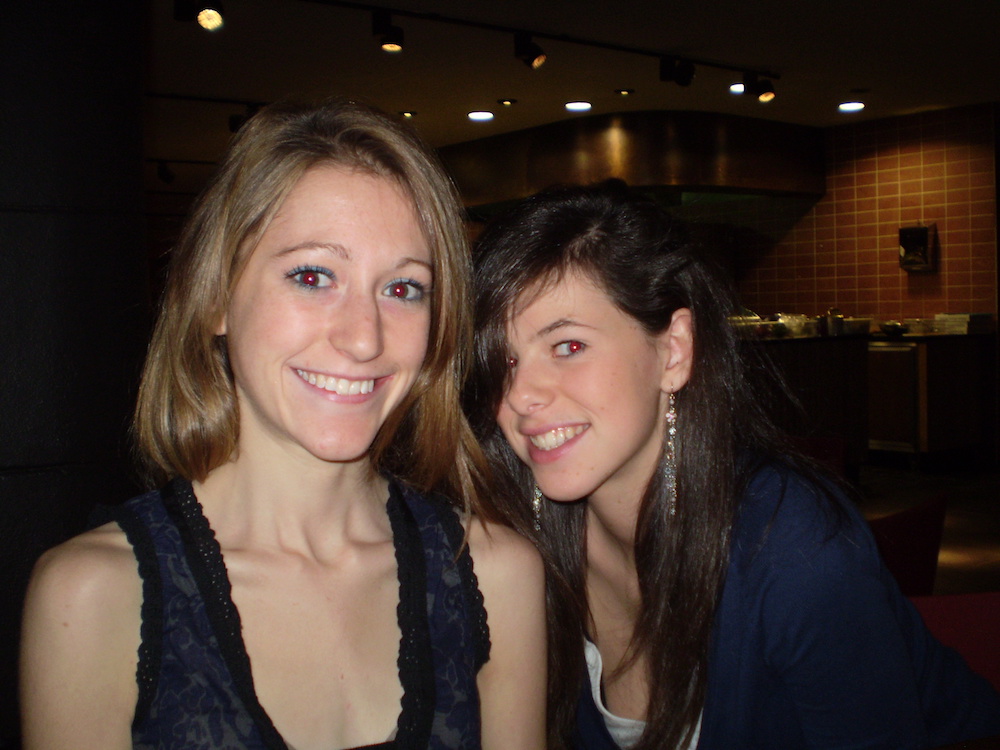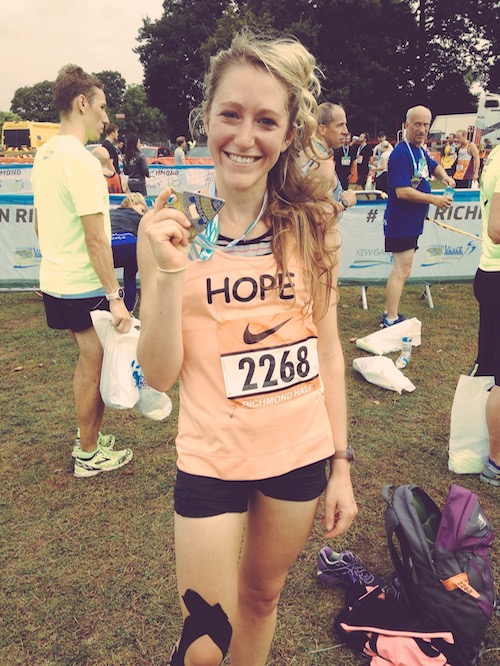Hope Virgo thought her anorexia was her best friend. In truth, it was destroying her life. Through courage and willpower, she finally discovered how to defeat her enemy
Lying in bed, the smell of vomit and sweat lingering over me, I couldn’t help feeling completely trapped, worthless and lost. I didn’t know what to do. I would rather be dead than keep on living like this. I thought back over the last day. I’d managed to survive on just an apple and, while most days were the same, I still got a feeling of success from it. As I walked home after netball practice, I knew that I would miss dinner, but when I got back my mum made me eat some food. Some days I had the energy to fight back, but this wasn’t one of those days. I was too tired, so I ate it quickly while downing a couple of glasses of water. Afterwards, I headed upstairs, turned on the shower, knelt over the toilet and vomited.
My head was spinning. I saw stars in front of my eyes. I allowed myself a moment of rest before doing it again. I kept going; I knew I had to. My anorexia urged me on. And I knew I would feel so much guilt if I didn’t get rid of all the food. I analysed my vomit in the toilet, making sure that everything was out. When my body was completely empty, I showered briefly and headed to my bedroom to work out for a few hours, before crawling into bed, exhausted from the day and knowing that in just a few hours this cycle would start again. At 5am, my alarm went off and I knew the pattern would start again. Weeks later, I was admitted to a mental health hospital.
The hospital admission paper said I had anorexia. But I wasn’t so sure. My ECG [electrocardiogram] results said my heart was in a critical position and could stop at any point. But did I really believe them? And did I really care? I couldn’t be about to die – I wasn’t even that thin.
We would queue up to be weighed, listening out for each other's weight and then trying to read one another's expressions to see how we felt
After I arrived at the mental health hospital, I had no idea of the battle that was about to commence. Each day was the same. Beginning at 7.30am, we would queue up outside the medical room to be weighed, listening out for each other’s weight and then trying to read one another’s expressions to see how we felt about our weight.
I learned the drill pretty quickly. Each morning, as I stood on the scales in my underwear, it became ever more terrifying as my weight went up. Following the weigh-ins, breakfast was served at 8am. The rest of the day looked like this:
•9am Group therapy, lessons, and bed rest.
•11am Snacks.
•11.20am More therapy, more lessons.
•12.30pm Lunch.
•1.15pm More therapy.
•4pm Snacks.
•4.30pm Visiting time.
•6.00pm Dinner.
•7pm Therapy group session.
•8pm Free time.
The days were long, but I knew I had to keep going. My first week was difficult. I was flung in to this hospital when I was just 17-years-old. All my friends were enjoying the freedom of upper sixth form and I was stuck here. I was angry at my parents for giving me no choice, and angry at my anorexia for making me like this. It was so unfair. Why did I have to be the person to get an eating disorder? I hated how trapped my life felt.
I had thought anorexia was everything to me. I thought she was my best friend, that she wanted to be there for me – but she didn’t. In reality, she didn’t give a shit about me. As I sit here now, in 2017, I can’t help but think back 10 years ago when I was sitting in hospital having just completed a 300-calorie snack. It felt like a whole other world.
As the battle began, I knew I had to beat anorexia but at the same time, I had to completely retrain myself. I had been so scared of food, so afraid to talk, and so obsessed with anorexia that it had become the norm. Now I knew it wasn’t normal. I was lucky I had such an amazing group of staff supporting me, and I owe them everything.
My first week flew by and it was all a bit of a blur. As I ate food, and my weight crept up, I immediately became afraid of getting fat. The days in hospital turned into weeks, then months, and as my 18th birthday approached I couldn’t quite believe how long I had been there.
My biggest frustration was how quickly the weight went on and how the mental side took so long to catch up. But I knew I was getting there. I had a dream to travel, have children, run marathons and go to university, so I had to keep fighting. And I learned to talk about how I was feeling. I looked forward to my weekly runs with worker Mandy, a bonus treat for me as the hospital knew how much I liked running. It was activities like this that gave me hope, and gave me a reason to keep going. I remember the first run. We headed out of the hospital and to a park with a lake. The fresh air on my face, the chill running through my body – I knew I wanted to fight my anorexia.
Without a year in hospital I could have died. I don't want to tell you it was easy, nor has it been plain sailing. But recovery is possible and worth it
A year later, I was discharged. I couldn’t quite believe it – a year in hospital – but I had done it. I was terrified. Part of me wanted to get skinny again but the other part knew this would probably kill me next time, so I stuck with it. I fought my anorexia night and day when she tempted me to slip. When she tried to suck me into her grasp, I refused to let her win. Not this time, and not ever!
Looking back, I know that without that year in hospital I could have died. I don’t want to lie and tell you it was easy, nor has it been plain sailing ever since. But recovery is possible, and so worth it. Anorexia is not your friend. She doesn’t care about you and she doesn’t understand you. You think she’s your best friend but she is a manipulative bitch – and I promise you that life is so much better when you realise this. Once you understand she is your enemy, you can start living, and enjoying food again.
Hope has written a book on her experiences, hoping to help inspire others struggling with an eating disorder. ‘Stand Tall Little Girl’ by Hope Virgo is published by Trigger Press.
Fe Robinson, MUKCP (reg), MBACP (reg) pyschotherapist and clinical supervisor, writes: Hope’s moving story underlines the importance of getting help if you are suffering with an eating disorder. Treatment is necessarily intense, and it saves lives. I am inspired by the way Hope found a connection to activities she loved, and used her goals for the future to fuel her recovery. She makes the point that mental transition can take a long time following a change, and how important it is to keep focused.





Comments